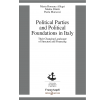Political Parties and Political Foundations in Italy. Their Changing Landscape of Structure and Financing
Synopsis
Pubblicato con licenza Creative Commons Attribuzione-Non Commerciale-Non opere derivate 3.0 Italia (CC-BY-NC-ND 3.0 IT) nella collana Diritto e Società - Open Access
This book, published with research funds from the University of Rome La Sapienza, aims at disseminating knowledge about the Italian system of political parties and political foundations among non-Italian scholars, in the light of the recent legislative reforms in this field. Due to their nature as free associations of citizens under art. 49 Cost., political parties are supposed to enjoy a full autonomy in determining their own purposes, internal organisation and financial management. However, the recent regulation on the funding of political parties contains provisions aimed at influencing the contents of party statutes, imposing upon them several organisational obligations. Moreover, some draft laws concerning the internal regulation of parties have been proposed, with the idea of making intra-party democracy not only a prerequisite for obtaining funds, but also for competing in elections.
However, many argue that a law should be the least invasive possible, and parties should instead proceed to self-reformation. The stronger the erosion process of party organisations and of political cultures is, the more strongly affirmed will be the personalised models of political organisation, in which even the funding of the organisation’s own public viability is managed autonomously. This is why ever more frequently some political leaders make use of think tanks for fund-raising, by virtue of the broad degree of autonomy that they enjoy.
Downloads


